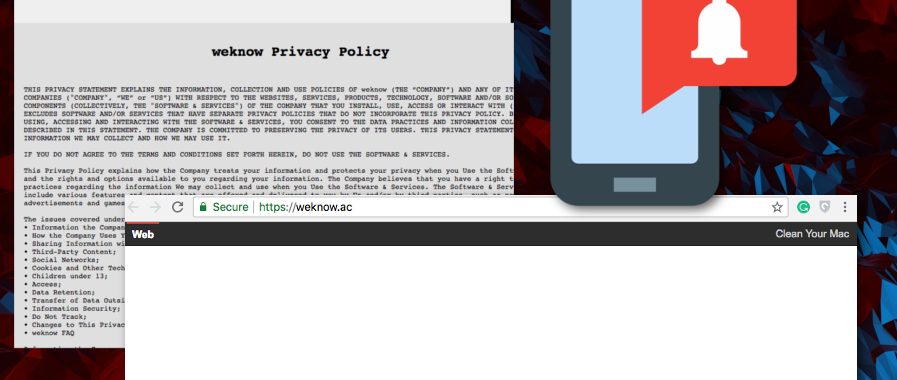Browser hijacker redirects to questionable websites and delivers intrusive, suspicious tools promoting advertisements
Search engine Weknow.ac affects various browsers on Mac OS and causes tons of unwanted activity on the device. This potentially unwanted program caught our attention because of the fact that changed settings of the browser and intrusive ads are not the only symptoms of this hijacker. Advertisements promoting rogue optimization and anti-spyware tools can also cause more damage than you think. Clicking on those pop-up windows or banners can cause installation of additional programs.
And any extension or toolbar added by the hijacker itself can affect the performance of your device. Any commercial content delivered to your screen is created by the advertiser who sponsored the Weknow.ac and its activity. Also, there is a huge issue with users’ data collecting and sharing.
You can see the official statement of Weknow.ac developers about the third-party involvement and data tracking:
We may collect or allow third parties to collect, through blocks of code called “pixels” or “web beacons”, certain information about you and send it to our servers and to our partners. We or our partners, package all or part of this information into small text files called Cookies and send the Cookie to your computer. As an example, Cookies may store search queries made through the Software & Services, the web pages you accessed, your interaction with advertisements presented to you via the Software & Services, features you used, your session duration and your configurations and preferences of the Software & Services.
Silent intruders can install other applications
This browser hijacker is one of many PUPs that come to your system silently and without permission. The most common way of spreading these infections is software bundles. When this technique is used freeware, and potentially unwanted programs can be packed together and installed during the insecure process. If you skip through steps and opt for Default or Quick installations you are not aware of the additional programs.
These additions can come with other tools or programs already or install additional browser extensions, toolbars or even optimization tools after the main infiltration. These silent infections cannot be called malicious, but this activity is certainly unwanted and intrusive. Also, if you keep this program on the device it significantly affects your time online and the general performance of a computer.
Browser hijacker intrusive activity
The first thing browser hijackers do after the silent infiltration is changing the settings of your browser:
- default search engine, homepage, and new tab set to Weknow.ac or another partner site;
- intrusive ads in various forms fill up the screen;
- each click on the advertisement redirects to rogue websites;
- every in-browser search delivers useless results;
- the random text turns into hyperlinks;
- commonly visited sites get injected with commercial content.
All this activity also initiate information gathering. When you search for something or visit various sites browser hijacker can access our most viewed sites, searched items or other browser history-related information. This data is later used to generate commercial content based on your personal preferences. It is helpful for the publisher because the main goal is to get your attention.

